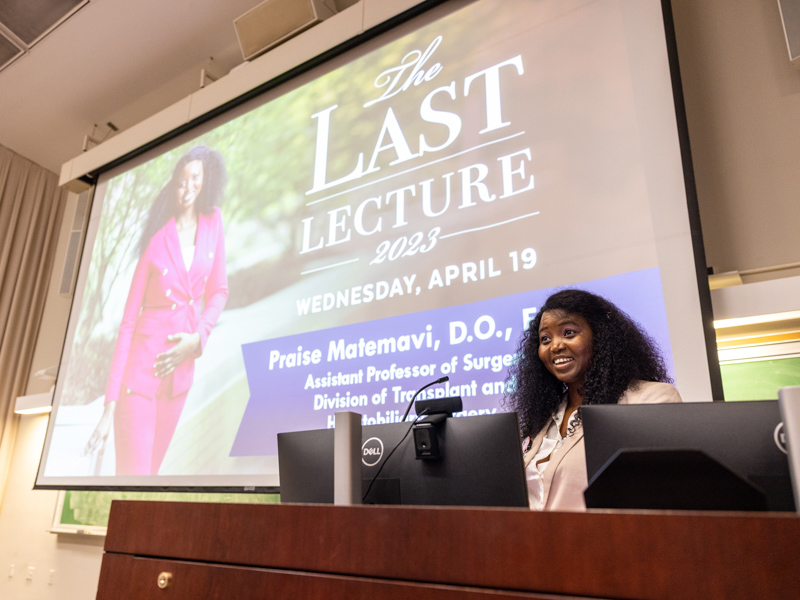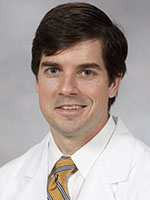The Power of Praise: Matemavi delivers Last Lecture

When she was a teenager, every day after school she would rush home to catch the next thrilling chapter of "Days of Our Lives."
Little did she know, she would say years later, that the days of Dr. Praise Matemavi would eventually blow that show right out of the water; so would the nights.
“For me, life has definitely been a soap opera,” the assistant professor of transplant surgery said last week as she delivered the 2023 Last Lecture at the University of Mississippi Medical Center; her audience was moved.
“Dr. Matemavi had me tearing up a couple of times,” said a member of that audience, Melanie Baker, a fourth-year medical student who served on the committee that helped choose this year’s lecturer. “We knew her experience, her path to medicine and how many hurdles she jumped to get there, was something we wanted her to be able to share.”
Presented by the Office of Development-Alumni Engagement, the Student Alumni Representatives (STARS) and the Associated Student Body, the Last Lecture is an occasion for selected faculty members to hold forth as if it is their last chance to pass on words of wisdom.

Chosen from among a slate of nominees, each Last Lecture honoree is part of a tradition adopted by many other institutions of higher learning since 2007. It began with a Carnegie Mellon University professor, Randy Pausch, a pancreatic cancer patient. Aware of his terminal diagnosis, Pausch presented the original Last Lecture, offering insights turned into a best-selling book.
On Wednesday, Matemavi became UMMC’s seventh Last Lecturer, but she brought many firsts: the first transplant surgeon, the first born in Africa, the first (probably) to go skydiving in Key West, and definitely the first to play "The A-Team" theme song at the Last Lecture.
That song from a TV show about a daring crew of adventurers was on her mind, she said, on a night years ago when she walked into a hospital in Detroit. There, she was part of a transplant team in charge of a donor whose organs “saved and changed eight people’s lives.
“I was amazed by the whole process, and the room felt sacred to me,” Matemavi recalled. “I remember pausing for a minute before we were closing, overwhelmed by the magnitude of what I had just witnessed.
“Even though the thoracic cavity and the abdominal cavity were essentially empty, I thought to myself, ‘I, too, want to be empty at the end of my life, to have used up all the talents and all the gifts given to me to the betterment of humanity.”
Matemavi’s life had barely started when she decided how she would do that.
Born in Zimbabwe, she had declared, at age 8 or 9, that she was going to be what she would actually become one day: a medical mission doctor. A couple of years later, she read, in one sitting, the story of neurosurgeon Dr. Ben Carson. “Gifted Hands” further inspired her to become a physician.
“I didn’t know much about America, but if this America place had poor kids in the slums that were becoming neurosurgeons, I wanted to go there,” she said.
“For me, that dream was ignited, and the fire in me, no matter what happened along the course of my life, that little fire always burned. That fire within me became my guiding force, even when everything seemed bleak and black.”
As a child, Matemavi nearly drowned; as a teenager, she endured – shaken, but otherwise unharmed – a 100-mph car wreck. “From this near-death experience, I knew that something good had to come of my life,” she said.
“My mother would always talk about how God protected her baby for a purpose, every time she drove past the scene of that car accident – every time, which was a lot.”
But there was, as she said, much bleakness ahead. She became an unmarried teenage mom. She was later married, but then became a divorced mother of two; along the way, she faced domestic abuse.
She deferred, for a while, her dream of becoming a surgeon. Even then, the worst was ahead, until the day she lost her mother, a nurse named Rose, to breast cancer.
Before her loss, Matemavi, too, became a nurse: She needed a way to make a living right away. At age 21, before her divorce, she became an RN to support her family. As she grappled with domestic abuse, she said, “my sense of self disappeared. I honestly didn’t know who I was. There was so much shame, and I had lost all of my confidence. …
“It was during this time that I learned that the burdens of life are not to be carried solo.” She leaned heavily on her loved ones, she said, and on God.
Faith is “crucial to my being,” she said. “Faith” is also the name of her older sister. Praise and Faith were named by their father, Titus Matemavi, a Seventh-Day Adventist minister whose example gave Praise a thirst for serving others.
The family had come to America for more opportunities; they found them in an Adventist enclave in Michigan, the state where, years later, Praise Matemavi would become a doctor, at the Michigan State College of Osteopathic Medicine.
To get there she had to, first, cram the equivalent of two years of credit hours into two semesters for a bachelor’s degree; a full account of that journey, and the rest of her story, is available here.
That story comes with Matemavi’s 10 lessons. No. 7 is “Face your fears head on” – which explains why an acrophobic transplant surgeon would jump out of a plane over Key West at 10,000 feet; that experience, she said. also prepared her for a difficult mission trip that was on the horizon.
No. 8 is “Time spent with your loved ones is never wasted.” Now remarried and part of a blended family, she has a list of loved ones that continues to grow.
Each lesson came with a lesson-learned illustration from Matemavi’s own life, including No. 4: “… Lean on others. It takes a village to succeed in your personal and professional life.” This hit home with her last year when one of her children went temporarily missing. Her partners at UMMC, she said, “rallied around me and they carried me through even when my faith was shaken.”

Among them was Dr. T. Mark Earl. “Dr. Matemavi is an amazing person, surgeon, friend and partner,” said Earl said, professor of transplant surgery. “Her story and life lessons are an inspiration to us all. We are so very lucky to have her at UMMC.”
Matemavi has spent part of her life telling stories that belong to others, but which are much like hers. One is “Passion and Purpose: Black Female Surgeons,” written for those who share dreams like her own and who have the courage to go after them.
“On your death bed you don’t want to look back and regret not doing something,” she said, “not betting on yourself, not giving yourself a chance, not loving hard, not going after your dreams, not facing your fears, not trying.”


